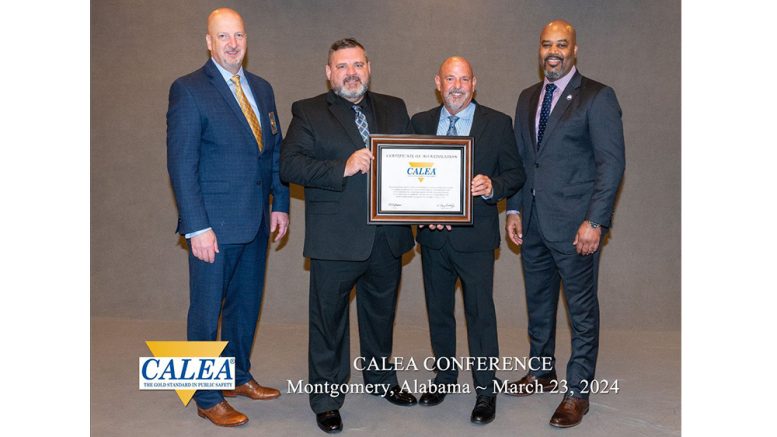The Westfield Police Department (WPD) was recently awarded national accreditation by the Commission on Accreditation for Law Enforcement Agencies, Inc. (CALEA). The agency was first accredited in 2016.
Following a multi-year self-assessment phase and a meticulous site-based assessment of community engagement, policy, procedures, equipment, and facilities by CALEA assessors, WPD Lieutenant Brodie Houston and Captain James “Jim” Lilly attended the CALEA conference in Montgomery, Ala. Each agency being reviewed goes before CALEA’s 21-member Board of Commissioners, which reviews all findings and determines the agencies’ accreditation status.
On the evening of the hearing, CALEA President Marcus Brown and Executive Director Craig Hartley awarded WPD reaccreditation, which signifies excellence in public safety and commitment to the community. This is WPD’s third award of national accreditation; the department now moves into CALEA’s four-year accreditation cycle which includes four annual remote, web-based file reviews and a site-based assessment in the fourth year.
“We’ve continued to tell the story that the men and women of the Westfield Police Department are some of the best in public safety, and this reaccreditation with CALEA confirms what we already knew,” Mayor Scott Willis said.
In 1979, the Commission was created through the combined efforts of four major law enforcement organizations: the International Association of Chiefs of Police, the National Organization of Black Law Enforcement Executives, the National Sheriffs’ Association, and the Police Executive Research Forum.
The Commission’s purpose is to develop standards based on international best practices in public safety and establish and administer the accreditation process. The accreditation process is how a public safety agency voluntarily demonstrates that it meets professionally recognized criteria for excellence in management and service delivery.
“This award of accreditation does not come easy,” CALEA President Marcus Brown said. “Agencies must go through a rigorous review and evaluation of their organization and then implement the necessary policy and procedure changes. The process does not stop at that point. By voluntarily seeking CALEA accreditation, the agency commits to an ongoing review of adherence to CALEA’s standards. Each community with CALEA accredited agencies should feel confident that their public safety organization is going above and beyond and operating under the highest standards in public safety.”
Benefits of Accreditation
- Controlled Liability Insurance Costs – Accredited status makes it easier for agencies to purchase liability insurance, allows agencies to increase the limit of their insurance coverage more easily, and, in many cases, results in lower premiums.
- Stronger Defense Against Lawsuits and Citizen Complaints – Accredited agencies can better defend themselves against lawsuits and citizen complaints. Many agencies report a decline in legal actions against them once they become accredited.
- Greater Accountability Within the Agency – Accreditation standards give the Chief Executive Officer a proven management system of written directives, sound training, clearly defined lines of authority, and routine reports that support decision-making and resource allocation.
- Support from Government Officials – Accreditation provides objective evidence of an agency’s commitment to excellence in leadership, resource management, and service delivery. Thus, government officials are more confident in the agency’s ability to operate efficiently and meet community needs.
- Increases Community Advocacy – Accreditation embodies the precepts of community-oriented policing. It creates a forum where police and citizens work together to prevent and control crime. This partnership helps citizens understand law enforcement challenges and gives law enforcement clear direction about community expectations.
- Improved Employee Morale – Accreditation is a coveted award that symbolizes professionalism, excellence, and competence. It requires written directives and training to inform employees about policies and practices, facilities, and equipment to ensure employee safety, and processes to safeguard employee rights. Employees take pride in their agency, knowing it represents the very best in public safety.
To learn more, visit calea.org.

